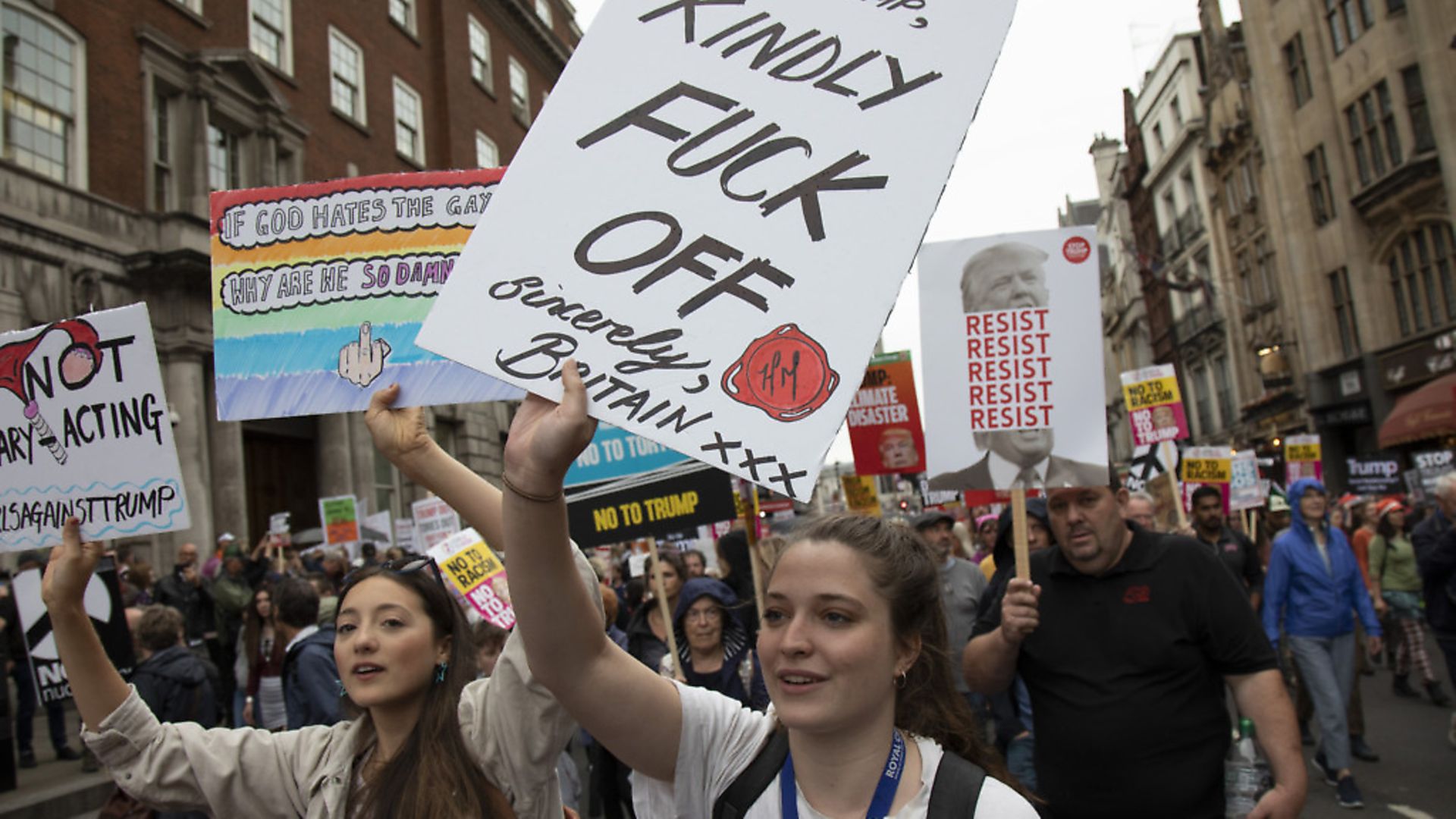
The American president is not another symbol of our already divided country, says ZOE WILLIAMS. He’s just a chump.
The state visit of the American president is analysed in two alternative universes. In one, he is an innately ludicrous figure: from his ridiculous tailoring to his clueless comportment, a man who besmirches his office so plainly that nothing geopolitical can be gleaned from him, other than that America is in big trouble.
In the other reading, he is yet another symbol of our divided politics: all those who support rule based-internationalism on one side, all those who’d prefer a ‘special relationship’ with the mighty on the other; all those who agree with Sadiq Khan that the UK’s values are diversity, equality and solidarity on one side, all those who prefer Thatcher’s tougher virtues, competition, survival of the fittest, on the other.
This is yet more meat in the banquet of the ‘metropolitan elite’ versus the ‘angry and authentic’, so bitter and resentful that it can only end – permit one more Game of Thrones reference before we all give over – like the Red Wedding.
It is both peculiar yet predictable that mainstream media analysis has largely coalesced around the second version of events: Sky News’ perspicacious Lewis Goodall noted that in one Newcastle anti-Trump demo, everyone was waving an EU flag: this is new world we’re in, where everything returns to Remain or Leave, to the extent that ordinary people actually possess an EU flag.
The BBC’s Norman Smith called Trump’s childish tweets about Khan a “grudge match with a capital G”; the logic being that, since Khan has voiced opposition in the past to America’s racist immigration policies, and since Trump has retaliated by calling the mayor “short”, what we’re witnessing is a garden variety culture clash, which the faithful reporter is only there to chronicle, and couldn’t possibly pick a side.
Robert Peston, typically, distilled this Kulturkampf interpretation in quite an interesting way: Jeremy Corbyn, in addressing the anti-Trump rally on Tuesday, was “playing explicitly to the metropolitan middle class gallery”, which would dent his standing with “those working class voters he claims to so desperately wish to retain”.
Loath as I am to belt-and-brace a point with Twitter-evidence – you can find anything on the internet if you look hard enough, ie, for five minutes – two observations rammed this new binary consensus home: one said that “anti-Americanism = anti-Semitism”, digging further into that ‘liberal’ v ‘real’ split, where the people who hate Trump also love Corbyn, also hate Israel, are therefore anti-Semitic and don’t forget they love Corbyn. QED.
At the same time, a meme went round (I paraphrase because there were photos involved); if you want to keep Trump out of the country, and bring Shamima Begum back into the country, then you are a special kind of stupid.
We’re two nations under one flag: the rule of law, universal human rights, cappuccino and anti-Semitism on one side; strength, decisiveness, trade deals, beer and Rule Britannia on the other.
The problem is that – to borrow a term from the political centrists – it’s bollocks. That first position, entirely forgotten in what is becoming the ‘respectable’ analysis, is the one held by most people in the United Kingdom.
Trump is a joke, a buffoon, representing nothing but his own vanity. His approval rating here is 21%, which – sorry to labour the maths – means 79% of Britons have a negative opinion of him: we haven’t seen the nation agreed so forcefully on a topic since Diane Abbott tried to drink a Mojito on a train.
Those approval ratings actually drop among older voters, where Trump is only at 17%: which completely capsizes the assumptions that are keeping these culture wars afloat, often described generationally as a shorthand, the young metropolitans versus the old left-behind.
Without question, many of the card-carrying members of the Conservative party are older; likewise, much of the Corbyn-surge of 2017 was powered by the young. But there has been a collective failure of the most basic reasoning process, here.
The Conservative party faithful have solidified around a world view, and if that puts Boris as its sun and moon, it is a fair bet that they also favour Trump. In Labour’s case, the faithful have tried to solidify around a world view, only to find that they weren’t quite authentic enough as voters for Len McCluskey and his henchpeople.
But irrespective of how well or badly they are served by their respective leaders, party members simply cannot do the job of weathervane for the country as a whole. Most people, Leave or Remain, do not support America’s attempted travel ban on Muslim-majority countries, or the incarceration of toddlers, separated from their parents.
Most people, Conservative or Labour, do not agree with grabbing women by the pussy, or telling lies in public office. Most people think statesmen should conduct themselves with dignity, which does not include starting Twitter fights in mid-air.
There are, I have no doubt, significant cultural, moral and ideological differences within these broad disapproval ratings; some of us will worry more about Trump’s internal domestic agenda, others will worry about Iran and North Korea, there will be an old-school whose primary concern is probity, a radical wing who think denigrating women to the degree the US president does is Handmaid’s Tale dystopian and taken nothing like seriously enough.
There will be plenty of people whose prime aim is to take back control and viscerally object to being told by a foreign power who we can buy our 5G from and what we should do with our NHS.
There will be others who think the whole idea of taking back control was fallacious on its own terms. It would be naive to suppose that just because we are broadly united on this one man, all our divisions are healed.
But a bit of naivety would be a respite from this peculiar determination to see everything through the Brexit prism, where the working classes want a strongman and will take any moral degradation that comes with him, while the middle classes want to cheer-lead for values that don’t cost them anything.
The most interesting intervention has been from the Queen. People have taken a puckish delight in pouring over her facial expressions, comparing the tight, sad formality with the frankly unprecedented smiles she bestowed on the Obamas. And her discretion has been widely compared with the president’s lack of it – the woman who never says what she thinks, meeting the man who tweets the first thing that pops into his head.
One Trump advisor opined that they were bound to get on, because Trump loves a brand, and the Queen has the most effective brand in the world. It said something about the peculiar myopia of his team, that they think other people’s royal families are trying to sell themselves to him, but it also took as read that she would be a logo, essentially; she may stand for something everybody understood, but of course she wouldn’t say it. If you had to say it, you wouldn’t be a logo.
In fact, the Queen was not reticent: “After the shared sacrifices of the Second World War, Britain and the United States worked with other allies to build an assembly of international institutions,” she said, outright rejecting Trump’s with-him-or-against-him rhetoric, in which we have to get out of the EU if we want to take our rightful place as America’s satrapy.
Our special relationship, in her framing, is indivisible from our wider allegiance to Europe, and the fruit of it is not in handshakes or banquets or warm words (“great, great”, he called Her Majesty, which is pretty warm), but in the painstaking work of building structures which he now routinely trashes.
She rammed this home with a reminder of what these institutions were for: “To ensure the horrors of conflict would never be repeated. While the world has changed, we are forever mindful of the original purpose of these structures: nations working together to safeguard a hard-won peace.”
It is interesting that Trump appeared to fall asleep during the speech, given the sharpness of its rebuke, and his notorious inability to take criticism of even the mildest kind.
If that can’t keep him awake – to be reminded on the world stage that the purpose of international relations is peace, and that our shared history is one not of victory and dominance, but of sacrifice and cooperation – it’s hard to say what could.
But we, too, need to wake up: we may be at war with ourselves on many things, but Donald Trump isn’t one of them.










